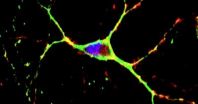(Press-News.org) WASHINGTON--With its strong dependence on gas-turbine engines for propulsion, the U.S. Navy is always looking for ways to improve the fuel consumption of these engines. At the Naval Research Laboratory (NRL), scientists are studying the complex physics of Rotating Detonation Engines (RDEs) which offer the potential for high dollar savings by way of reduced fuel consumption in gas-turbine engines, explains Dr. Kazhikathra Kailasanath, who heads NRL's Laboratories for Computational Physics and Fluid Dynamics.
Many Navy aircraft use gas-turbine engines for propulsion, with the Navy's gas-turbine engines being fundamentally similar to engines used in commercial airplanes. The Navy also depends on gas-turbine engines to provide propulsion and electricity for many of its ships. Even as future ships move toward the model of an "all electric" propulsion system, they will still need gas-turbine engines to produce electricity for the propulsion system and other critical systems. So building a gas-turbine engine that can handle the Navy's requirements for its warfighting ships and provide a fuel-efficient engine is a high priority for researchers.
The U.S. Navy finds gas-turbine engines attractive because they scale nicely to large powers, are relatively small and self-contained, and are relatively easy to maintain. The gas-turbine engines the Navy uses today are based on the Brayton thermodynamic cycle, where air is compressed and mixed with fuel, combusted at a constant pressure, and expanded to do work for either generating electricity or for propulsion. To significantly improve the performance of gas-turbine engines, researchers need to look beyond the Brayton cycle to explore alternative and possibly more innovative cycles.
NRL researchers believe that one attractive possibility is to use the detonation cycle instead of the Brayton cycle for powering a gas-turbine. NRL has been on the forefront of this research for the last decade and has been a major player in developing Pulse Detonation Engines (PDEs).
The Rotating Detonation Engine (RDE) is an even more attractive and different strategy for using the detonation cycle to obtain better fuel efficiency. NRL researchers have constructed a model for simulating RDEs using earlier work done on general detonations, as a foundation.
NRL researchers believe that RDEs have the potential to meet 10% increased power requirements as well as 25% reduction in fuel use for future Navy applications. Currently there are about 430 gas turbine engines on 129 U.S. Navy ships. These engines burn approximately 2 billion dollars worth of fuel each year. By retrofitting these engines with the rotating detonation technology, researchers estimate that the Navy could save approximately 300 to 400 million dollars a year.
Like PDEs, RDEs have the potential to be a disruptive technology that can significantly alter the fuel efficiency of ships and planes; however, there are several challenges that must be overcome before the benefits are realized, explains Dr. Kailasanath. NRL scientists are now focusing their current research efforts on getting a better understanding of how the RDE works and the type of performance that can be actually realized in practice.
INFORMATION:
Navy researchers look to rotating detonation engines to power the future
2012-11-02
ELSE PRESS RELEASES FROM THIS DATE:
Solar system's birth record revised
2012-11-02
Some 4.567 billion years ago, our solar system's planets spawned from an expansive disc of gas and dust rotating around the sun. While similar processes are witnessed in younger solar systems throughout the Milky Way, the formative stages of our own solar system were believed to have taken twice as long to occur. Now, new research lead by the Centre for Star and Planet Formation at the Natural History Museum of Denmark, University of Copenhagen, suggests otherwise. Indeed, our solar system is not quite as special as once believed.
Using improved methods of analysis of ...
Disaster defense: Balancing costs and benefits
2012-11-02
Do costly seawalls provide a false sense of security in efforts to control nature? Would it be better to focus on far less expensive warning systems and improved evacuation procedures that can save many lives?
Seth Stein, a Northwestern University geologist, has teamed up with his father, Jerome Stein, an economist at Brown University, to develop new strategies to defend society against natural disasters like Hurricane Sandy as well as the effects of climate change.
The approach, which considers costs and benefits while looking for the best solution, is based on a ...
Were dinosaurs destined to be big? Testing Cope's rule
2012-11-02
Boulder, CO, USA – In the evolutionary long run, small critters tend to evolve into bigger beasts -- at least according to the idea attributed to paleontologist Edward Cope, now known as Cope's Rule. Using the latest advanced statistical modeling methods, a new test of this rule as it applies dinosaurs shows that Cope was right -- sometimes.
"For a long time, dinosaurs were thought to be the example of Cope's Rule," says Gene Hunt, curator in the Department of Paleobiology at the National Museum of Natural History (NMNH) in Washington, D.C. Other groups, particularly ...
Study: Alcohol, drug abuse counselors don't always require total abstinence
2012-11-02
WASHINGTON – Compared to a survey conducted nearly 20 years ago, about twice the proportion of addiction counselors now find it acceptable for at least some of their patients to have a drink occasionally – either as an intermediate goal or as their final treatment goal, according to a new study published by the American Psychological Association.
The researchers surveyed 913 members of the National Association of Alcoholism and Drug Addiction Counselors from across the United States. About 50 percent of the respondents said it would be acceptable if some of their clients ...
Difficult-to-read font reduces political polarity, study finds
2012-11-02
CHAMPAIGN, lll. — Liberals and conservatives who are polarized on certain politically charged subjects become more moderate when reading political arguments in a difficult-to-read font, researchers report in a new study. Likewise, people with induced bias for or against a defendant in a mock trial are less likely to act on that bias if they have to struggle to read the evidence against him.
The new research, reported in the Journal of Experimental Social Psychology, is one of two studies to show that subtle manipulations that affect how people take in information can ...
Abstract thinking can make you more politically moderate
2012-11-02
CHAMPAIGN, lll. — Partisans beware! Some of your most cherished political attitudes may be malleable! Researchers report that simply answering three "why" questions on an innocuous topic leads people to be more moderate in their views on an otherwise polarizing political issue.
The research, described in the journal Social Psychological and Personality Science, explored attitudes toward what some people refer to as the ground zero mosque, an Islamic community center and mosque built two blocks from the site of the former World Trade Center in New York City. When the Islamic ...
Researchers 'watch' antibiotics attack tuberculosis bacteria inside cells
2012-11-02
NEW YORK (Nov. 1, 2012) -- Weill Cornell Medical College researchers report that mass spectrometry, a tool currently used to detect and measure proteins and lipids, can also now allow biologists to "see" for the first time exactly how drugs work inside living cells to kill infectious microbes. As a result, scientists may be able to improve existing antibiotics and design new, smarter ones to fight deadly infections, such as tuberculosis. The new study was published in today's early online edition of Science.
"The development of antibiotics has been stalled for several ...
Why seas are rising ahead of predictions
2012-11-02
Boulder, CO, USA – Sea levels are rising faster than expected from global warming, and University of Colorado geologist Bill Hay has a good idea why. The last official IPCC report in 2007 projected a global sea level rise between 0.2 and 0.5 meters by the year 2100. But current sea-level rise measurements meet or exceed the high end of that range and suggest a rise of one meter or more by the end of the century.
"What's missing from the models used to forecast sea-level rise are critical feedbacks that speed everything up," says Hay. He will be presenting some of these ...
Bird tree tells new tale of evolution
2012-11-02
Contact:
Arne Mooers, 778.782.3979, amooers@sfu.ca
Carol Thorbes, PAMR, 778.782.3035, cthorbes@sfu.ca END ...
Berkeley Lab scientists help develop promising therapy for Huntington's disease
2012-11-02
There's new hope in the fight against Huntington's disease. A group of researchers that includes scientists from the U.S. Department of Energy's Lawrence Berkeley National Laboratory (Berkeley Lab) have designed a compound that suppresses symptoms of the devastating disease in mice.
The compound is a synthetic antioxidant that targets mitochondria, an organelle within cells that serves as a cell's power plant. Oxidative damage to mitochondria is implicated in many neurodegenerative diseases including Alzheimer's, Parkinson's, and Huntington's.
The scientists administered ...




